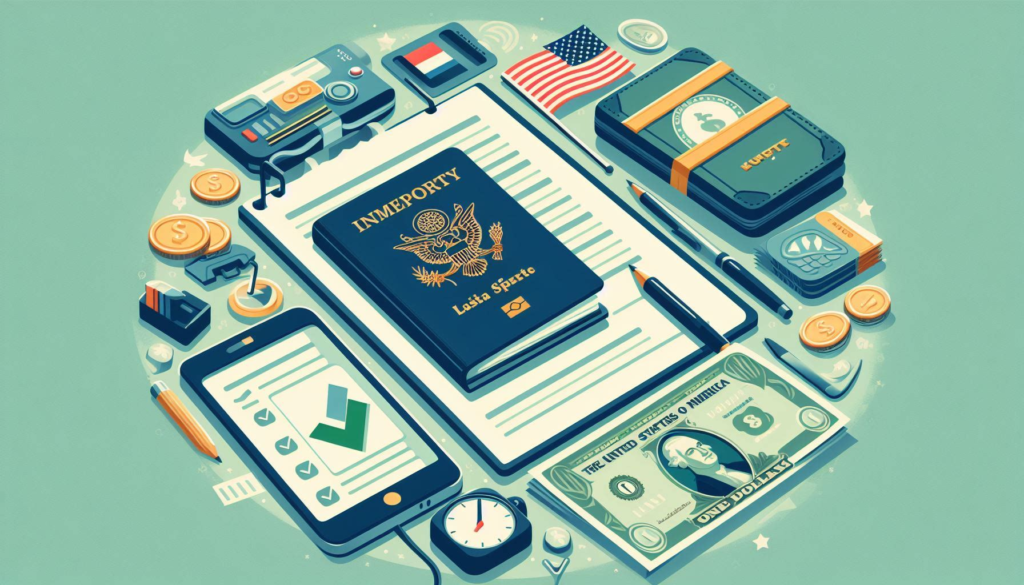When you move to a new country, everything can seem unfamiliar and daunting – the language, the culture, the food, and especially the financial system. Understanding personal finance is crucial for everyone, but it’s particularly important for immigrants who are trying to navigate a new economic landscape.

Personal finance is all about managing your money. It’s about understanding how much money you have, where it’s going, and how to best allocate it to meet your needs and goals. It involves all the financial decisions an individual or family must make in order to earn, budget, save, and spend money over time. These decisions are generally made with the consideration of financial risks and future life events.
For immigrants, understanding personal finance in their new country can be a daunting task due to differences in financial systems, laws, and practices. The banking system, credit scores, taxes, insurance, retirement plans – all these might work very differently from what you’re used to in your home country.
But don’t worry, it’s not as complicated as it might seem at first. With some time, patience, and the right information, you can learn to navigate the financial waters of your new home. This article aims to provide you with a comprehensive guide to personal finance for immigrants, covering everything from opening a bank account to planning for retirement.
Remember, the journey of a thousand miles begins with a single step. So, let’s take that first step together towards understanding and mastering personal finance in your new home. Stay tuned for the next section where we will discuss the importance of financial literacy for immigrants.
The Importance of Financial Literacy: Why Financial Literacy is Essential for Immigrants
Have you ever found yourself lost in a new city without a map? That’s what it can feel like for immigrants trying to navigate the financial landscape of a new country without financial literacy. Financial literacy is not just about knowing how to count your pennies and dimes. It’s about understanding how money works – how to earn it, how to save it, how to invest it, and how to use it to help others.

Financial literacy is the bedrock upon which stable, prosperous lives are built. It’s the key that unlocks the door to financial freedom, the compass that guides us through the complex world of personal finance. Without it, we’re like sailors adrift at sea, at the mercy of the winds and waves. With it, we’re captains of our own destiny, able to chart a course towards our financial goals and dreams.
For immigrants, financial literacy is even more critical. Imagine trying to navigate that new city without a map, but also without knowing the language or the customs. That’s what it’s like for immigrants trying to understand personal finance in a new country. The banking systems, the tax laws, the retirement plans – everything is different. And without a solid understanding of these things, it’s easy to make mistakes that could have serious financial consequences.
But here’s the good news: financial literacy is a skill that can be learned. And it’s never too late to start learning. There are resources available, like this article, that can help you understand the basics of personal finance. And once you understand the basics, you can start to apply that knowledge to your own financial situation.
So, whether you’re an immigrant trying to understand personal finance in a new country, or you’re just someone trying to get a better handle on your finances, remember this: financial literacy is not a luxury, it’s a necessity. It’s not something that’s nice to have, it’s something you need to have. Because in the end, financial literacy is not just about money. It’s about having the knowledge and the skills to make informed decisions about your financial future.
Opening a Bank Account: Steps to Open a Bank Account
Imagine you’ve just moved to a new country. You’re excited, maybe a little nervous, and ready to start your new life. One of the first things you’ll need to do is open a bank account. But where do you start? Don’t worry, we’ve got you covered.

Opening a bank account is like getting a key to your financial house. It’s where you’ll deposit your paycheck, pay your bills, and save for your future. It’s also a crucial step in building a credit history in your new country, which can help you when you need to rent an apartment or get a loan.
So, how do you open a bank account? Here are some steps to guide you:
- Research Your Options: Not all banks are created equal. Some banks may offer services that others don’t. Do some research to find out which bank is the best fit for you. Consider factors like fees, interest rates, and customer service.
- Gather Your Documents: To open a bank account, you’ll typically need some form of identification, proof of address, and a social security number or taxpayer identification number. The exact requirements may vary from bank to bank, so it’s a good idea to call ahead or check the bank’s website.
- Visit the Bank: Once you’ve gathered your documents, it’s time to visit the bank. Some banks may allow you to open an account online, but it’s often a good idea to visit in person, especially if you have questions.
- Fill Out the Application: At the bank, you’ll need to fill out an application to open an account. This will include information like your name, address, and social security number or taxpayer identification number.
- Deposit Money: After your application is approved, you’ll need to deposit money into your new account. The amount required will vary depending on the bank and the type of account you’re opening.
And voila! You’ve opened your first bank account in your new country. But remember, opening a bank account is just the first step. To truly master personal finance, you’ll need to understand how to manage your money, build a budget, save for the future, and more. But don’t worry, we’ll cover all of that in the upcoming sections. Stay tuned!
Building Credit History: Importance of Credit History
Imagine you’re at a store, ready to make a big purchase. You’ve been saving for months and you’re finally ready to buy. But when you go to pay, your credit card is declined. Why? Because you don’t have a credit history.

Building a credit history is like building a reputation. It’s a way for banks and other lenders to see how reliable you are when it comes to paying back money you’ve borrowed. It’s one of the most important aspects of personal finance, especially for immigrants who are new to a country’s financial system.
So, how do you build a credit history? Here are some steps to guide you:
- Open a Bank Account: This is often the first step in building a credit history. Having a bank account in good standing can show lenders that you’re financially responsible.
- Apply for a Credit Card: Once you have a bank account, you can apply for a credit card. Start with a low limit card and use it responsibly. This means paying off your balance in full each month and never missing a payment.
- Pay Your Bills On Time: This includes everything from your rent to your utility bills. Late payments can negatively impact your credit score.
- Don’t Max Out Your Credit Cards: Try to keep your credit card balance below 30% of your total credit limit. High balances can lower your credit score.
- Be Patient: Building a good credit history takes time. But with consistent, responsible credit use, you’ll eventually build a strong credit history that will help you in many aspects of your financial life.
Remember, a good credit history can open many doors. It can help you rent an apartment, get a job, and even get better rates on insurance. So start building your credit history today, and watch as the opportunities start to open up.
Understanding Taxes: Tax System for Immigrants
Taxes. Just the word alone can make people’s heads spin. But as Benjamin Franklin once said, “In this world, nothing can be said to be certain, except death and taxes.” So, let’s try to make sense of it, shall we?

Taxes are a compulsory contribution to state revenue, levied by the government on workers’ income and business profits, or added to the cost of some goods, services, and transactions. In simpler terms, taxes are how we help pay for the things we use every day, like roads, schools, and hospitals.
For immigrants, understanding the tax system in a new country can be a bit like trying to learn a new language. It’s unfamiliar, it’s complex, and it’s easy to get lost. But don’t worry, we’re here to help.
Here are some key points to understand about taxes:
- Income Tax: This is a tax on the money you earn from your job, your business, or your investments. The amount you pay depends on how much you earn and the tax laws in your new country.
- Sales Tax: This is a tax on goods and services that you buy. The amount you pay depends on the price of the goods or services and the tax rate in your area.
- Property Tax: If you own property, like a house or land, you may have to pay property tax. The amount you pay depends on the value of your property and the tax rate in your area.
- Tax Returns: A tax return is a form you fill out to report your income and taxes paid to the government. It’s usually due once a year.
- Tax Benefits: Depending on your situation, you may be eligible for certain tax benefits, like deductions or credits, which can reduce the amount of tax you owe.
Remember, taxes are a part of life. And while they can be confusing, especially for immigrants, they’re also an important part of contributing to and benefiting from the society we live in. So take the time to understand them, seek help when you need it, and always pay your taxes on time.
Retirement Planning: Importance of Retirement Planning
Have you ever dreamed of a day when you no longer have to work? A day when you can wake up when you want, do what you love, and spend time with the people you care about? That’s what retirement can be like – if you plan for it.

Retirement planning is like planting a tree. The best time to start was 20 years ago. The second best time is now. It involves setting retirement income goals and making decisions to reach those goals. It’s about figuring out how much money you’ll need in retirement and coming up with a plan to save that money.
For immigrants, retirement planning can be especially challenging. You’re not just planning for your future, you’re planning for your future in a new country. The retirement system, the social security benefits, the tax implications – all these might be different from what you’re used to.
Here are some steps to guide you in your retirement planning:
- Set Your Retirement Goals: How much money will you need in retirement? When do you want to retire? What kind of lifestyle do you want to have in retirement? These are all questions you’ll need to answer.
- Understand Your Retirement Options: Most countries have some form of social security benefits, but you’ll likely need more than that to live comfortably in retirement. Understand what retirement savings options are available to you, such as employer-sponsored retirement plans or individual retirement accounts.
- Create a Savings Plan: Once you know how much you need to save and what your options are, it’s time to create a savings plan. This might involve setting aside a certain amount of money each month or making investments to grow your savings.
- Stick to Your Plan: Retirement planning is not a one-time thing. It’s a lifelong process. Keep track of your progress and make adjustments as needed.
- Seek Professional Advice: Retirement planning can be complex. Don’t hesitate to seek help from a financial advisor or retirement planning professional.
Remember, retirement is supposed to be the golden years of your life. But to make that dream a reality, you need to start planning today. So plant that tree now, nurture it, and watch it grow. Your future self will thank you.
Insurance: Types of Insurance
Imagine you’re about to embark on a long journey. You’ve packed your bags, planned your route, and you’re ready to go. But what if something goes wrong along the way? What if you get sick, or your car breaks down, or you lose your luggage? That’s where insurance comes in.

Insurance is like a safety net. It’s there to catch you when you fall, to protect you from the financial impact of unexpected events. It’s a contract between you and an insurance company, where you pay a premium in exchange for the insurance company’s promise to cover certain losses.
For immigrants, understanding the different types of insurance available in a new country can be a crucial part of financial planning. Here are some common types of insurance you might consider:
- Health Insurance: Health insurance covers medical expenses. It’s essential because healthcare can be very expensive, especially in the event of a serious illness or injury.
- Car Insurance: If you own a car, car insurance is a must. It can help cover the cost of repairs if you get into an accident, and it can also protect you from liability if you’re at fault in an accident.
- Home Insurance: Home insurance covers your home and your belongings in case of damage or theft. If you’re renting, you might consider renters insurance, which covers your personal property in your rental home.
- Life Insurance: Life insurance provides a payout to your loved ones if you pass away. It can help cover funeral costs and provide financial support to your family.
- Disability Insurance: Disability insurance provides income if you’re unable to work due to a disability. It can help you maintain your standard of living if you’re unable to earn an income.
Remember, insurance is all about protection. It’s about protecting yourself, your family, and your assets from unexpected events. So take the time to understand your insurance options, and choose the ones that are right for you.
Investment Opportunities: How to Invest Wisely
Imagine you’re on a journey, and you’ve come across a crossroads. One path leads to a comfortable, but unexciting life. The other path is a bit more challenging, but it promises a life of adventure and prosperity. Which path would you choose? If you’re like most people, you’d probably choose the second path. And that’s what investing is all about.

Investing is like taking the road less traveled. It’s about taking calculated risks today for the promise of a better tomorrow. It’s about putting your money to work for you, instead of just letting it sit in a bank account.
For immigrants, understanding the investment opportunities in a new country can be a key part of achieving financial success. Here are some common types of investments you might consider:
- Stocks: Stocks represent ownership in a company. When you buy a stock, you’re buying a piece of that company. Stocks can be risky, but they can also provide high returns.
- Bonds: Bonds are like loans that you give to a company or government. In return, you get regular interest payments and the promise that your loan will be paid back at a certain date.
- Mutual Funds: Mutual funds are a collection of stocks, bonds, or other investments. They’re managed by professional fund managers, which can make them a good choice for beginners.
- Real Estate: Real estate can be a profitable investment. You can make money from rental income, or you can make money when the property increases in value.
- Retirement Accounts: Retirement accounts like 401(k)s or IRAs offer tax advantages for retirement savings. They can be a great way to save for retirement and invest at the same time.
Remember, investing is not a get-rich-quick scheme. It’s a long-term strategy for financial growth and security. So take the time to understand your investment options, make informed decisions, and be patient. Your future self will thank you.
Avoiding Financial Scams: Tips to Avoid Scams
Imagine you’re walking down a bustling street in a new city. You’re taking in the sights, the sounds, the smells. Suddenly, a stranger approaches you with an offer that seems too good to be true. What do you do? This is what it can feel like when you’re faced with a financial scam.

Financial scams are like wolves in sheep’s clothing. They often appear as attractive opportunities, promising high returns with little risk. But in reality, they’re designed to take your hard-earned money.
For immigrants, avoiding financial scams is a crucial part of financial literacy. Scammers often target immigrants, exploiting their lack of familiarity with the financial system in their new country. But with the right knowledge, you can protect yourself and your money.
Here are some tips to help you avoid financial scams:
- Be Skeptical: If something seems too good to be true, it probably is. Be wary of offers that promise high returns with little or no risk.
- Do Your Research: Before you invest your money, take the time to research the opportunity. Look for reviews or complaints online, and check if the company is registered with the appropriate regulatory bodies.
- Protect Your Personal Information: Never give out your personal information, like your social security number or bank account details, unless you’re sure the person or company you’re dealing with is legitimate.
- Beware of Pressure Tactics: Scammers often try to pressure you into making a decision quickly. Take your time, and don’t let anyone rush you into making a decision.
- Seek Professional Advice: If you’re unsure about an investment opportunity, seek advice from a financial advisor or lawyer.
Remember, your money is your future. Protect it with knowledge, skepticism, and caution. And if you ever find yourself a victim of a financial scam, don’t be ashamed. Report it to the authorities and seek help. You’re not alone, and there are resources available to help you.
Final Thoughts
And so, we’ve reached the end of our journey. We’ve navigated the complex world of personal finance, explored the challenges and opportunities that immigrants face, and hopefully, equipped you with the knowledge and tools you need to achieve financial success in your new home.
Remember, personal finance is not a destination, it’s a journey. It’s a lifelong process of learning, growing, and adapting. And while it can be challenging, especially for immigrants, it’s also incredibly rewarding. With every step you take, you’re not just building a better financial future for yourself, you’re also contributing to the economic prosperity of your new country.
So, whether you’re just starting out on your personal finance journey, or you’re well on your way, remember this: You have the power to shape your financial future. With knowledge, planning, and perseverance, you can achieve your financial goals and dreams.
And finally, remember that you’re not alone. There are resources available to help you, from financial advisors to online articles like this one. So don’t be afraid to seek help when you need it. After all, we’re all in this together.
Thank you for joining us on this journey through personal finance for immigrants. We hope you found it informative and helpful. Here’s to your financial success in your new home! Stay tuned for more articles on various topics that can help you navigate life in your new country. Safe travels on your financial journey!
